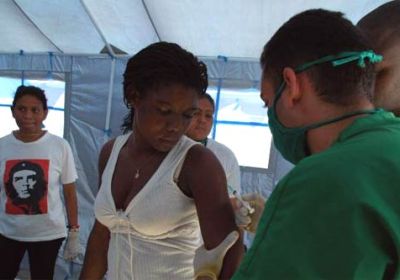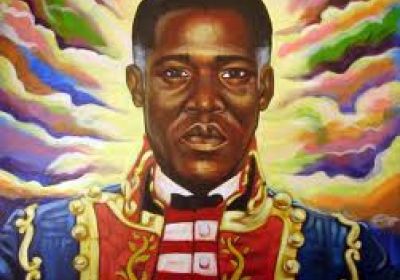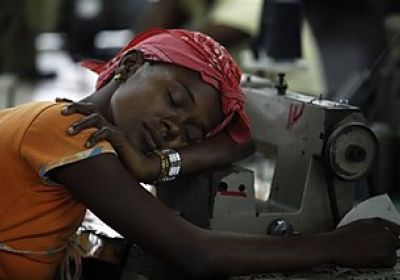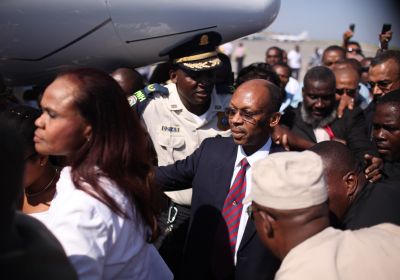Haiti’s New Dictatorship: The Coup, the Earthquake & the UN Occupation
Justin Podur
Pluto Press, 2012
280 pp, $44.00
There seems to be no lie too base, no crime too awful that the “international community” has not committed against the tiny nation of Haiti ― the poorest country in the western hemisphere.
Canadian solidarity activist Justin Podur explains in exacting detail every slander and misrepresentation peddled by imperialist governments and retailed by the Western media to justify the continuing denial of Haitian sovereignty that began in 2004.
-
-
A revealing story about the lawsuit against the United Nations over a cholera outbreak in Haiti was broadcast on the Canadian Broadcasting Corporation’s The World At Six on November 13. The report began: “The United Nations is among those leading the effort to get aid to the Philippines. But even as it helps out with this natural disaster, it is haunted by the ghosts of another.”
-
 The Big Truck That Went By, How the World Came to Save Haiti and left Behind a Disaster By Jonathan M. Katz Palgrave Macmillan, 2013 282 pp., $24.95 On January 12, 2010, Haiti, one of the poorest countries in the world, was devastated by a huge earthquake. Death toll estimates range from between 100,000 to more than 300,000. Nobody really knows, because Haiti was poorly governed beforehand and virtually taken over by foreign governments and non-government organisations (NGOs) afterwards.
The Big Truck That Went By, How the World Came to Save Haiti and left Behind a Disaster By Jonathan M. Katz Palgrave Macmillan, 2013 282 pp., $24.95 On January 12, 2010, Haiti, one of the poorest countries in the world, was devastated by a huge earthquake. Death toll estimates range from between 100,000 to more than 300,000. Nobody really knows, because Haiti was poorly governed beforehand and virtually taken over by foreign governments and non-government organisations (NGOs) afterwards. -
An unprecedented lawsuit has been launched against the United Nations over the world body’s responsibility for the cholera epidemic in Haiti that exploded in October 2010. The epidemic killed more than 8300 people and stricken more than 650,000. The legal action was formally launched in New York City on October 9 by the Boston-based Institute for Justice and Democracy in Haiti (IJDH), its partner office in Port au Prince, the Office of International Lawyers (BAI), and the Miami-based civil rights law firm Kurzban, Kurzban, Weinger, Tetzelli & Pratt (KKWT).
-
 Toussaint Louverture: The Story of the Only Successful Slave Revolt in History; A Play in Three Acts CLR James, edited by Christian Hogsbjerg Duke University Press 2013 222 pp., $47.99 Hegel, Haiti & Universal History Susan Buck-Moss University of Pittsburgh Press 2009 176 pp., $89.99 “I was born a slave, but nature gave me the soul of a free man,” said Toussaint Louverture, the leader of the successful Haitian slave revolt of 1791 to 1804.
Toussaint Louverture: The Story of the Only Successful Slave Revolt in History; A Play in Three Acts CLR James, edited by Christian Hogsbjerg Duke University Press 2013 222 pp., $47.99 Hegel, Haiti & Universal History Susan Buck-Moss University of Pittsburgh Press 2009 176 pp., $89.99 “I was born a slave, but nature gave me the soul of a free man,” said Toussaint Louverture, the leader of the successful Haitian slave revolt of 1791 to 1804. -
 "Haiti offers a marvelous opportunity for American investment," reported Financial America in 1926. "The run-of-the-mill Haitian is handy, easily directed and gives a hard day's labor for 20 cents, while in Panama the same day's work costs [US]$3." That may be the most honest portrayal of the offshore industry in Haiti yet.
"Haiti offers a marvelous opportunity for American investment," reported Financial America in 1926. "The run-of-the-mill Haitian is handy, easily directed and gives a hard day's labor for 20 cents, while in Panama the same day's work costs [US]$3." That may be the most honest portrayal of the offshore industry in Haiti yet. -
A social and political rights movement of indigenous people is rising across Canada and making international headlines. Protests by the “Idle No More” movement began last month and continue to grow. The movement has rallied daily across the country in shopping malls, at US border crossings and on major railway lines. Three days ago, it compelled Canadian Prime Minister Stephen Harper to climb down from his refusal to meet with indigenous leaders to discuss their very deep concerns.
-
“As if the mud, misery, loss of life and homelessness in Hurricane Sandy’s wake weren’t bad enough, the worst may yet be to come for disaster-ravaged Haiti,” Caribbean360.org said on October 31. The article said: “Massive crop damage throughout the southern third of the country, as well as the likelihood of a spike in cases of cholera and other water-borne diseases, could mean that the impoverished country will experience the deadliest effects of the storm’s havoc in the days and weeks ahead.
-
The devastating impact of Hurricane Sandy on impoverished Haiti has received far less attention than the havoc wrecked by the superstorm on the United States' east coast. This lack of coverage extend as far as US site WFSB.com reporting on October 30 on the "first Sandy-related death", days after as many of 65 people in the Caribbean (51 in Haiti) had been killed by the freak storm. Below, progressive alternative news outlet based in the US, Democracy Now!, looked at Sandy's impact on Haiti and the Caribbean in this October 29 report.
-
Member countries of Latin America’s alternative integration bloc, the Bolivarian Alliance for the Peoples of Our America (ALBA), met for its 11th summit in Caracas on February 4 and 5 to discuss advancing the organisation. ALBA is made up of the governments of Venezuela, Cuba, Bolivia, Ecuador, Nicaragua, Dominica, Saint Vincent and the Grenadines, and Antigua and Barbuda. Formed in 2004, ALBA seeks to develop trade on the basis of solidarity and cooperation.
-
 United States officials led a far-reaching international campaign aimed at keeping former Haitian president Jean-Bertrand Aristide exiled in South Africa, secret US State Department cables show. Aristide, who won the 2000 presidential elections, was rendered a virtual prisoner for the past seven years. Aristide was overthrown in a bloody February 2004 coup supported by Washington and fomented by right-wing paramilitary forces and the Haitian elite.
United States officials led a far-reaching international campaign aimed at keeping former Haitian president Jean-Bertrand Aristide exiled in South Africa, secret US State Department cables show. Aristide, who won the 2000 presidential elections, was rendered a virtual prisoner for the past seven years. Aristide was overthrown in a bloody February 2004 coup supported by Washington and fomented by right-wing paramilitary forces and the Haitian elite. -
 United States diplomatic cables released by WikiLeaks make it clearer than ever that foreign troops occupying Haiti for more than seven years, under the banner of the United Nations, have no legitimate reason to be there. They show that this a US occupation, as much as in Iraq or Afghanistan, and it is part of a decades-long US strategy to deny Haitians the right to democracy and self-determination.
United States diplomatic cables released by WikiLeaks make it clearer than ever that foreign troops occupying Haiti for more than seven years, under the banner of the United Nations, have no legitimate reason to be there. They show that this a US occupation, as much as in Iraq or Afghanistan, and it is part of a decades-long US strategy to deny Haitians the right to democracy and self-determination.